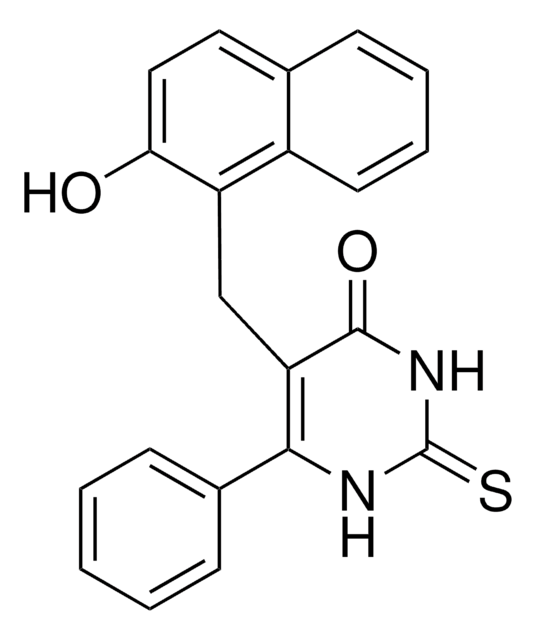S8825
Salermide
≥98% (HPLC)
Sinónimos:
N-{3-[(2-Hydroxy-naphthalen-1-ylmethylene)-amino]-phenyl}-2-phenyl-propionamide
About This Item
Productos recomendados
Quality Level
assay
≥98% (HPLC)
form
powder
storage condition
desiccated
color
yellow
solubility
DMSO: >10 mg/mL
storage temp.
2-8°C
SMILES string
CC(C(=O)Nc1cccc(c1)\N=C\c2c(O)ccc3ccccc23)c4ccccc4
InChI
1S/C26H22N2O2/c1-18(19-8-3-2-4-9-19)26(30)28-22-12-7-11-21(16-22)27-17-24-23-13-6-5-10-20(23)14-15-25(24)29/h2-18,29H,1H3,(H,28,30)/b27-17+
InChI key
HQSSEGBEYORUBY-WPWMEQJKSA-N
Application
Biochem/physiol Actions
Features and Benefits
related product
Storage Class
11 - Combustible Solids
wgk_germany
WGK 3
Certificados de análisis (COA)
Busque Certificados de análisis (COA) introduciendo el número de lote del producto. Los números de lote se encuentran en la etiqueta del producto después de las palabras «Lot» o «Batch»
¿Ya tiene este producto?
Encuentre la documentación para los productos que ha comprado recientemente en la Biblioteca de documentos.
Artículos
We offer a variety of small molecule research tools, such as transcription factor modulators, inhibitors of chromatin modifying enzymes, and agonists/antagonists for target identification and validation in gene regulation research; a selection of these research tools is shown below.
Nuestro equipo de científicos tiene experiencia en todas las áreas de investigación: Ciencias de la vida, Ciencia de los materiales, Síntesis química, Cromatografía, Analítica y muchas otras.
Póngase en contacto con el Servicio técnico








